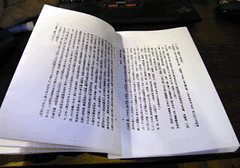吾自寐言
屎后主讳纬?
Submitted by kzeng on Mon, 2006-01-16 02:26在google上无聊的google李商隐,翻阅到了著名的那句“小怜玉体横陈夜,已报周师入晋阳”,点开原来是维基百科的高纬词条,词条的下面有一个《北齐书·帝纪第八》的链接,随手点击进去看看,却发现一件很有趣的事情,这个天津中医学院转载的《北齐书·帝纪第八》开首第一句:
屎后主讳纬,字仁纲,武成皇帝之长子也。
呵呵,我们都知道齐后主荒淫无道,但是写《北齐书》的李百药断不会在后主前加一个“屎”字,所以纳闷,既然这个天津中医学院要在维基百科上链结自己的东西,为什么不先校勘一下自己的文字?不过更有趣的是想这个“屎”字是怎么来的,于是google了“屎后主讳纬”,终于找到了始作俑者,原来是国学网站,大概是为了防止别人任意复制它的内容,它网站上收录的文字的前后加入了不少冗字,直接在它的网站上阅读时显示不出来,但是如果ctrl+A全选就可以看到,如果转贴的人不注意,只是ctrl+A,ctrl+C, ctrl+V,就着了国学网站的道,贴出一个“屎后主讳纬"的结果来。呵呵,一切都不知为哪般:)
Drupal五岁了!
Submitted by kzeng on Sun, 2006-01-15 04:57
drupal五岁了!五年前,drupal 1.00正式发布,当时的发布信息如下:
Today, drop.org announces the release of drupal 1.00 after an extensive period of testing. Drupal is a full-featured content management/discussion engine using Apache/PHP/MySQL and suitable to setup a news-driven community or portal site similar to kuro5hin.org and slashdot.org. Current features include discussion forums, web-based administration, theme support, an open submission queue, content management, a modularized design, PHP sessions, user management with access control and username/profanity/hostname filters, error logging, a public diary module, an affiliate site module, backend/headline generation (RSS/RDF) and much more.
Drupal 生日快乐!:)
| Attachment | Size |
|---|---|
| 14.44 KB |
Google 的中文名字?
Submitted by kzeng on Sat, 2006-01-14 22:05在新浪上看到Google要起一个中文名字,以便与百度竞争中文搜索市场:
“Google中国本地化的下一步是斟酌起一个中国名字。”Google大中华区总裁周邵宁表示,要真正融入中国市场,必须有一个独特而不俗的中国名字,“不一定要像可口可乐、宝马那样朗朗上口,但一定要深入人心”。
呵呵,胡思乱想一下gogle的汉语翻译成什么才会比较上口,百度自然是“众里寻他千百度”的意思,那么google呢?我觉得如果想婉约一些,不如把google翻译为“顾盼”,这边顾盼,那边百度,挺有趣的;或者更直白一些,翻译为“顾问”,不管怎样,这个“顾”字还是挺不错的,及谐音,又谐意。呵呵,不过这样的翻译还是比较差劲,远不如可口可乐与宝马翻译的好,当年刚学的德语的时候,课后列出了一些常用缩写,读到Bayerische Motoren Werke,一楞神,巴伐利亚摩托工厂,好土的名字,一看缩写BMW,原来是宝马!:)
Drupal 可以做什么?
Submitted by kzeng on Sat, 2006-01-14 17:35
Drupal 就像一个块橡皮泥,可以做很多东西。目前经常可以看到的是把 Drupal 作为个人blog,但是drupal的用途远不止于此,所以想大致说说 drupal 的用途,以及作为 blog 的优势。
首先, drupal 可以作为一个内容管理工具,并且毫不逊色于老牌的CMS譬如Xoops,PHPNuke等,通过一个非常简单的界面,成员可以发布各种各样的内容,譬如 新闻、blog、投票、图片、论坛主题、以及下载等。并且这个系统的主题非常的灵活,可以随意的更改,以适合你的需要(参看这里)。同时Drupal还有方便的分类系统,支持很多 web 2.0 的特色譬如 tag,总体的以及各个分类的rss,trackback等等。另外 Drupal 还可以设定用户的角色,使得不同的用户拥有不同的访问权限,配合一些模块使用,可以很方便的作为以内容为主的商业网站,类似起点中文,或是幻剑书盟那样原创文学购买阅读网站,也可以通过e-commerce模块作为一个纯粹的网上购物网站,譬如GoodStorm。当然 drupal 也非常适合作一般的新闻网站,譬如 The Onion 就是用drupal搭建的。
其次,drupal 既可以作为个人blog,也可以作为集体blog。前者如我这里,后者如台湾部落格以及原来的postshow。其实我觉得drupal最大的潜质之一就是作为集体blog (community blog),兴趣相投的朋友们可以搭建一个共同的blog,一起写作,一起分享快乐,boing boing 和 slashdot 就是这么发展起来的。台湾总统府有一个宪改blog,也是用drupal搭建的,原来我以为是个恶作剧后来看了域名果然是 president.gov.tw ,呵呵,也说明了drupal的影响力吧。另外 Hi-PDA 也是一个用drupal搭建的集体blog的典范。依我看来,community blog完全可以替代 bbs,它比 bbs 功能更加强大。
再次,drupal 可以作为以讨论为主的社区网站。这可以看作是 集体blog的一个升级,志趣相投的人们不仅可以在blog上畅所欲言,还可以通过的drupal的来进行一些集体活动,譬如发布community新闻,组织一些活动,再一起聚餐等等。
最后,drupal 可以提供一个协作的平台。可以用来开发开源软件(drupa.org 就是一个很好的例子),也可以用来协作撰写书籍(利用book模块),还是编纂资料库(利用wiki模块)
总之,drupal提供了一个非常灵活的平台。而 drupal 作为一个个人blog,也有一些胜出其他blog软件譬如 wordpress 的地方,最大的特点就是drupal的可扩展性。在任何时候,你都可以方便的把你的blog升级为个人网站,或是集体blog,或者丰富网站的内容,使之不再简单的局限于日志,譬如用drupal,很容易就可以搭建一个个人的相册,自己有全部的权限;也可以很方便的利用GMAP模块,为自己添加一个有特色的旅行日志。所以从长远看,即便是作为个人网站,drupal 仍然不失为一种不错的选择。:)
补充:一些 drupal 应用的实例
除去上文提到的一些例子外,下面收集了一些 drupal,特别是中文 drupal 的应用实例:
呵呵,这个列表还不是很全,希望大家一起补充,把drupal的作用发挥到极致!:)
Why Hypocrisy?
Submitted by kzeng on Sat, 2006-01-14 04:04I've just read my comrade ranc's blog about hypocrisy. It's an interesting question, as he states in the first paragraph :
Why do people (politicians and ordinary folks alike) pretend to be publicly spritied and appeal to collective interests in private arguments and public discourses, when often times it is a piece of common knowledge that they are really motivated exclusively by self-interests? If we accept the standard operational assumption of rationality in economics (and political science), why can't people just tell each other what they really want for themselves and strike a honest bargain? Yes it would be a naked bargain, but why pretending to be clothed if all know that all are naked? This is especially bewildering since the truth revelation principle tells us that no outcome can be better than having each other revealing their true types. In a word, why hypocrisy?
He gives several plausible answers and has a thoughtful discussion. But I feel that those answers are not very "neat" in rationalist sense because most of them invoke theories and assumptions from other intellectual traditions ( and sociological one, in particular). According to those hard-core social scientists and followers of Lakatos, solving a problem in this way is theoretically degenerative.
Actually, I don't think this question is difficult for rationalists. Although often times it is a piece of common knowledge that politicians are really motivated exclusively by self-interests, it does not rule out the possibility that the interests of some politicians are "accidentally" identical with that of the median voter. Let's think about the following one-shot game scenario: 1) the public is unclear about a candidate's real preference; 2) the candidate's preference may or may not be idnetical with the median voter; 3) To claim that his preference is the same as the median voter weakly dominates telling the truth because it gives the candidate better chance to win the election. It weakly dominates becaues the public may not believe the claim is informative.
In a different scenario, say, a repeated game. Hypocrisy can be viewed as an investment of reputation. In order to get a better chance to be trusted and thus gain more in the future, a politician may speak and act in accordance with public interests that are quite different from his own in the first stage. And later on, after he is trusted or re-elected, he may take advantage of the trust or position and satisfy his own real desire.
There are many examples in history which indicate the logic above. Han Feizi may be an example for the first scenario; while Wang Mang is for the second.
自己做书
Submitted by kzeng on Sat, 2006-01-14 00:36
是自己做书,不是写书。现在买书非常不方便,虽然网上有些不错的资源,可以down到掌上电脑上看也很方便,但是这些资源毕竟还是非常有限的。于是就订阅了超星,但是读书的乐趣之一就是可以舒服的歪着看书(sigh,现在戴眼镜的原因),虽然笔记本电脑也很轻巧,但是散热实在受不了,也不方便,所以就想到了自己做书,其实也没有什么技术含量,现把超星的书打成PDF格式,然后再打印下来。反正现在打印耗材也很便宜,staple经常会送免费的打印纸;网上有可以买到DIY的打印机墨水瓶,打完以后,拿两个长尾夹夹起来,然后把夹子上的铁丝去下来,就成了一本装订好了的书,可以方便的猫在某个角落,一边听下雪,一边看书了:)
blog 古今谈
Submitted by kzeng on Wed, 2006-01-11 23:02游戏文字,切莫当真
blog者,今人多以为舶来品,西人谓之web log是也。此说谬矣。blog乃我中华固有之物,古时之“笔录”是也,后传于西方,遂音译为 bilu。然西人云bi者,音近于“白”,为求精准,故改为b·lu,类若BBQ。且西人亦不喜以元音置于词尾,遂转书为b·log,讹为blog。
笔录者,随笔记录是也,又有笔记、散记﹑随笔﹑琐记、笔谈﹑杂识﹑日记﹑劄记等异名。笔录源于先秦,出于稗官、街谈巷语、道听途说者之所造也,《汉书·艺文志》称之为“小说”,此亦误也。后于魏晋之时,笔录日盛,流传至今者如晋张华之《博物志》、干宝之《搜神记》及南朝刘义庆之《世说新语》。其内容多志怪轶事。至于唐代,演志怪为传奇,变轶事为杂录,譬如《酉阳杂俎》是也。宋人笔录,多史实,少传奇,如司马光之《涑水记闻》、王明清之《挥尘录》等皆为一时传诵。又有重考据证实之笔录,如沈括之《梦溪笔谈》、洪迈之《容斋随笔》、王应麟之《困学纪闻》等俱为精品。有明一代,笔录传世甚少,盖因清帝修编《四库全书》,销毁殆尽。清人之笔录,可谓集历代之大成,顾炎武撰《日知录》、钱大昕撰《十驾斋养心录》,又为其中翘楚。清末西夷侵陵,我中土之笔录遂衰,后播于西方,于近年复兴,是为blog也。
